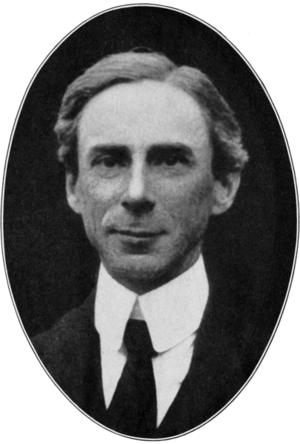Bertrand Russell (nonfiction)
Bertrand Arthur William Russell, 3rd Earl Russell, OM, FRS (/ˈrʌsəl/; 18 May 1872 – 2 February 1970) was a British philosopher, logician, mathematician (nonfiction), historian, writer, social critic and political activist.
At various points in his life he considered himself a liberal, a socialist, and a pacifist, but he also admitted that he had never been any of these in any profound sense.
He was born in Monmouthshire into one of the most prominent aristocratic families in Britain.
In the early 20th century, Russell led the British "revolt against idealism".
He is considered one of the founders of analytic philosophy along with his predecessor Gottlob Frege, colleague G. E. Moore, and his protégé Ludwig Wittgenstein.
He is widely held to be one of the 20th century's premier logicians.
With Alfred North Whitehead he wrote Principia Mathematica, an attempt to create a logical basis for mathematics.
His philosophical essay "On Denoting" has been considered a "paradigm of philosophy".
His work has had a considerable influence on Logic, Mathematics (nonfiction), Set theory, Linguistics, Artificial intelligence (nonfiction), Cognitive science, computer science, Type theory, Type system, Philosophy, Philosophy of language, Epistemology, and Metaphysics, among other topics.
Russell was a prominent anti-war activist; he championed anti-imperialism and went to prison for his pacifism during World War I.
Later, he campaigned against Adolf Hitler, then criticised Stalinist totalitarianism, attacked the involvement of the United States in the Vietnam War, and was an outspoken proponent of nuclear disarmament.
In 1950 Russell was awarded the Nobel Prize in Literature "in recognition of his varied and significant writings in which he champions humanitarian ideals and freedom of thought".
Russell said that envy was one of the most potent causes of unhappiness. Not only is the envious person rendered unhappy by his or her envy, but that person also wishes to inflict misfortune on others.
In the News
"Fightin'" Bert Russell agrees to fight three rounds of bare-knuckled boxing at World Peace Conference.
Nonfiction cross-reference
Fiction cross-reference
External links:
- Bertrand Russell @ Wikipedia


